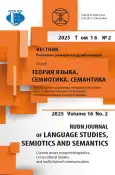“Wandering in the Worlds” by B. Kairbekov: the Role of Autometatext in the Interpretation of a Translingual Work
- Авторлар: Nurmaganbet K.E.1, Sinyachkin V.P.2, Azizova A.O.3, Demchenko A.S.1
-
Мекемелер:
- Al-Farabi Kazakh National University
- RUDN University
- International University of Tourism and Hospitality
- Шығарылым: Том 16, № 2 (2025): Current issues in psycholinguistics, cross-cultural studies, and multichannel communication
- Беттер: 528-542
- Бөлім: LANGUAGE THEORY
- URL: https://journal-vniispk.ru/2313-2299/article/view/323528
- DOI: https://doi.org/10.22363/2313-2299-2025-16-2-528-542
- EDN: https://elibrary.ru/DTXOAP
- ID: 323528
Дәйексөз келтіру
Толық мәтін
Аннотация
Due to its heterogeneous nature, a translingual literary text causes certain difficulties for research. Being created by the author in a language that is not ethnically primary for him, it contains both exophonic elements marking its foreign cultural origin and semiotically “neutral” components, the decipherment of which requires certain interpretative efforts from the researcher. The purpose of this study is to appeal to the autometatextual complex as a hermeneutic field for producing meanings that meaningfully explicate the works of a writer/poet. Autometatext is understood as an author’s text about a text, commenting on and revealing other works of the same author. Thus, the lexemes “sky”, “guest”, “elders”, which are semiotically neutral for the Russian language, acquire sacred symbolism in the lyrics of the Kazakh poet Bakhyt Kairbekov, since they appeal to an alternative denotative space that expands the original field of meanings. The material for the study was the book by Bakhyt Kairbekov “Nomads in the Worlds” and individual poems of the poet. The methods of the study are descriptive; the method of hermeneutic commentary; the method of autometatextual interpretation. The results of the analysis allow us to conclude that turning to the autometatext gives the interpretation of the poet’s lyrical works greater reliability and multidimensionality: in the texts of works written in Russian, motives of the original Kazakh culture begin to sound, such as the nomadic way of life, faith in the supreme deity Tengri, veneration of aruakhs and others. The data obtained can be applied in the practice of interpreting translingual literary text by researchers studying similar issues.
Негізгі сөздер
Авторлар туралы
Karlygash Nurmaganbet
Al-Farabi Kazakh National University
Email: inyaz@mail.ru
ORCID iD: 0000-0001-9380-7572
PhD candidate, Department of Russian Philology and World Literature
71 l-Farabi Ave., Almaty, Republic of Kazakhstan, 050040Vladimir Sinyachkin
RUDN University
Хат алмасуға жауапты Автор.
Email: word@list.ru
ORCID iD: 0000-0002-2098-6298
Dr.Dc. (Philology), Professor, Head of the Department of Russian Language and Intercultural Communication, Institute of Russian Language
6 Miklukho-Maklaya St., Moscow, Russian Federation, 117198Ainur Azizova
International University of Tourism and Hospitality
Email: ainura_28_87@mail.ru
ORCID iD: 0000-0002-1871-7398
PhD in Philology, Acting Associate Professor
14 “A” Rabigi Sultan Begim St., Turkestan, Republic of Kazakhstan, 161200Alyona Demchenko
Al-Farabi Kazakh National University
Email: alenchika@mail.ru
ORCID iD: 0000-0002-0635-9247
PhD in Philology, Senior Lecturer of the Department of Russian Philology and World Literature
71 l-Farabi Ave., Almaty, Republic of Kazakhstan, 050040Әдебиет тізімі
- Valikova, O.A., Sinyachkin, V.P., & Kulieva, Sh.A. (2023). Ontic Elements as Markers of Translinguality in E. Mizhit’s Poems. New Research of Tuva, (40), 171–184. (In Russ.). https://doi.org/10.25178/nit.2023.4.12 EDN: WKGXLE
- Gachev, G.D. (1999). National images of the world. Eurasia as a cosmos of a nomad, a farmer and a highlander. Moscow: Institute DIDIK publ. (In Russ.). EDN: XBXDGX
- Amineva, V.R., & Khabibullina, A.Z. (2024). Description as a technique for studying “national images of the world”. In: National literatures of the Volga and Ural regions: research paradigms and practices: materials of the All-Russian scientific and practical seminar, L.Sh. Galieva, F.Kh. Minnullina (eds.). Kazan: IYALI of G. Ibragimov publ. (In Russ.).
- Pu, R.Q., & Li, H.F. (2018). The Translingual Expressions in Overseas Chinese English Writings. Interdisciplinary Studies of Literature, 3(2), 257–271.
- Sorvari, M. (2018). Altering language, transforming literature: Translingualism and literary self-translation in Zinaida Linden’s fiction. Translation Studies, 11(2), 158–171. https:// doi.org/10.1080/14781700.2017.1399820
- De Donno, F. (2021). Translingual Affairs of World Literature Rootlessness and Romance in Jhumpa Lahiri and Yoko Tawada. Journal of World Literature, 6(1), 103–122. https://doi. org/10.1163/24056480-20201005 EDN: PDCJSU
- Alvorado, L.Y. (2010) Beyond Nation: Caribbean Poetics n Pedro Pietri’s “Puerto Rican Obituary” And Kamau Brathwaite’s “Islands and Exiles”. Centro Journal, 22(2), 50–73.
- Kellman, S.G. (2003). Switching languages: translingual authors reflect on their craft. Lincoln and London: University of Nebraska Press.
- Wilson, R. Cultural mediation through translingual narrative. Web. Target Online. URL: https://benjamins.com/online/target/articles/target.23.2.05wil (accessed: 09.01.2025).
- Bakhtikireeva, U.M., & Shagimgereeva, B.E. (2020). Linguistic existence of a creative personality: Bakhyt Kairbekov. Social and humanitarian sciences in the Far East, 17(1), 83–89. (In Russ.). https://doi.org/10.31079/1992-2868-2020-17-1-83-89 EDN: KNINDS
- Trivedi, M. (2023). World Englishes and World Englishes Literature: A critical study. Cognitive Discourses. International Multidisciplinary Journal, 1(3). URL: http://cdimj.naspublishers. com/vol_1Issue_3.html (accessed: 4.01.2025).
- Ayupov, N.G. (2012). Tengrianism as an Open Worldview. Almaty: KazNPU named after Abay. (In Russ.).
- Valikova, O.A., Shagimgereeva, B.E., & Kulieva, Sh.A. (2020). Cosmos in logos: translingual poetry of E. Mizhit and B. Kairbekov. New Research of Tuva, (4), 230–249. https://doi. org/10.25178/nit.2020.4.16 (In Russ.). EDN: GMVEOJ
- Kremer, E.N. (2010). Problems of Russian-foreign bilingualism (linguistic and ethnic identity of a bilingual personality) [PhD thesis]. Moscow. (In Russ.). EDN: QEUWBB
Қосымша файлдар









